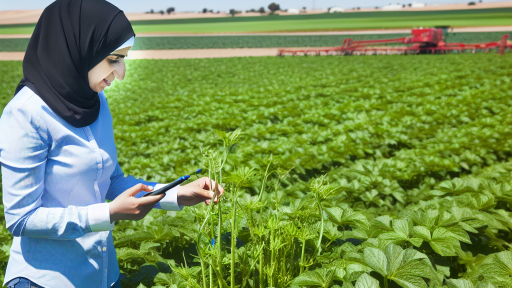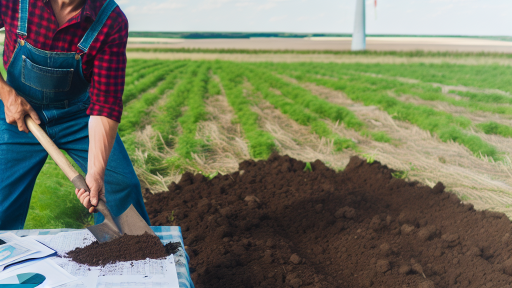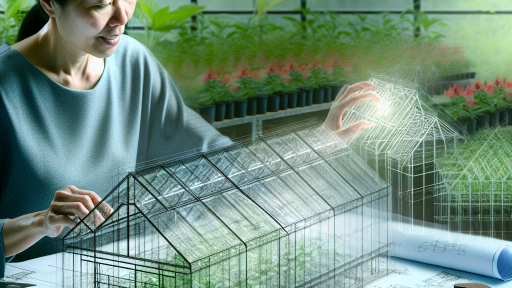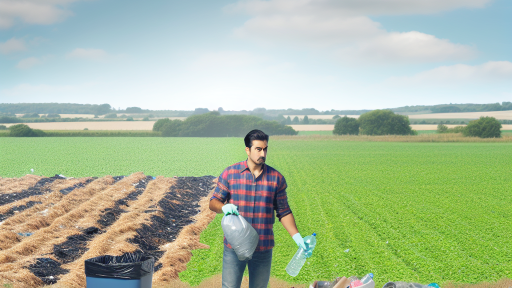Introduction to Farm Waste: Types and Sources
Understanding Farm Waste
Farm waste refers to any unwanted byproduct from agricultural operations.
It includes a variety of materials that can be categorized in different ways.
Common sources of farm waste include crop residues, livestock manure, and unused chemicals.
Types of Farm Waste
Different types of farm waste serve various purposes and present distinct challenges.
Crop residues consist of stems, leaves, and roots left after harvesting.
Livestock manure originates from animals such as cattle, poultry, and pigs.
Unused chemicals may include pesticides and fertilizers that remain after use.
Other waste includes plastic packaging and discarded equipment.
Sources of Farm Waste
Farm waste arises from multiple sources within agricultural settings.
Cultivated fields generate organic waste during planting and harvesting.
Animal husbandry operations contribute significantly through manure production.
Processing plants, involved in food production, also add to the waste burden.
Moreover, transportation and storage contribute to overall waste generation.
Impact of Farm Waste
Improper management of farm waste can have serious environmental consequences.
For instance, it can lead to soil degradation and pollution of local waterways.
Transform Your Agribusiness
Unlock your farm's potential with expert advice tailored to your needs. Get actionable steps that drive real results.
Get StartedAdditionally, methane emissions from manure contribute to climate change.
Effective waste management practices are essential to mitigate these impacts.
The Importance of Waste Management in Agriculture
Defining Agricultural Waste
Agricultural waste consists of non-reusable byproducts from farming activities.
This waste includes plant residues, livestock manure, and pesticides.
Understanding its types is crucial for effective management.
Environmental Impact of Waste
Poor waste management leads to environmental degradation.
It can pollute soil, water, and air quality.
In contrast, effective management protects ecosystems.
Economic Benefits
Transforming waste into resources can boost the agricultural economy.
Farmers can reduce costs by recycling materials.
Additionally, they can sell converted products for profit.
Social Responsibility
Farmers play a vital role in community health through waste management.
Responsible practices improve food safety and public health.
Engaging in sustainable practices promotes environmental awareness.
Technological Innovations
Innovative technologies enhance waste management efficiency.
Biogas production from manure is a prime example.
Additionally, composting technologies improve soil health.
Strategies for Effective Waste Management
Implementing reduction, recycling, and reuse strategies is essential.
Farmers should prioritize minimizing waste at the source.
Regular training helps in adopting sustainable practices.
Collaboration and Community Engagement
Farmers should collaborate with local organizations for better outcomes.
Community workshops raise awareness of waste management benefits.
Establishing networks enhances resource sharing and innovation.
Overview of Methods to Transform Farm Waste
Composting Techniques
Composting effectively recycles organic farm waste.
Showcase Your Farming Business
Publish your professional farming services profile on our blog for a one-time fee of $200 and reach a dedicated audience of farmers and agribusiness owners.
Publish Your ProfileThis process enriches soil with nutrients.
Farmers can use backyard compost bins or larger compost facilities.
The composting process typically takes several months.
Regular turning promotes aeration and speeds decomposition.
Biogas Production
Biogas production harnesses anaerobic digestion.
This method converts organic waste into methane gas.
Farmers can use manure and crop residues for this process.
Biogas can power generators, providing renewable energy.
The remaining digestate serves as a nutrient-rich fertilizer.
Biochar Stockpiling
Biochar contributes to carbon sequestration.
This stable form of carbon enhances soil fertility.
Farmers create biochar by pyrolyzing biomass waste.
This process involves heating organic material in low oxygen.
Biochar application improves soil moisture retention.
Animal Feed Production
Transforming crop waste into animal feed is highly efficient.
Farmers can utilize by-products like distiller grains and hulls.
This practice reduces feed costs and waste disposal issues.
Proper treatment promotes the safety of feed products.
It also optimizes nutrition for livestock in the long term.
Fertilizer Production
Farm waste can be processed into organic fertilizers.
This process often involves pelletizing or granulating methods.
Organic fertilizers enrich soil and reduce chemical dependency.
Farmers can apply these fertilizers to improve crop yields.
Using this method fosters sustainable agricultural practices.
Mulching Techniques
Mulching farm waste reduces soil erosion and conserves moisture.
Farmers can use crop residues or wood chips as mulch.
This practice enhances soil structure and promotes biodiversity.
Additionally, mulch prevents weed growth effectively.
Over time, mulched material decomposes and enriches the soil.
Explore Further: Conservation Tillage Basics For Beginner Farmers
Composting: Turning Organic Waste into Nutrient-Rich Soil
Understanding Composting
Composting is a natural process of recycling organic material.
This process transforms food scraps and yard waste into rich soil.
It provides essential nutrients for plants, enhancing their growth.
The Composting Process
The composting process involves breaking down organic waste.
Microorganisms, such as bacteria and fungi, play a crucial role.
They decompose materials, releasing heat and speeding up the process.
In turn, this creates a nutrient-dense product called compost.
Benefits of Composting
Composting offers numerous benefits for the environment and farming.
- It reduces landfill waste significantly.
- Composting enriches soil, making it more fertile.
- It helps retain moisture, reducing the need for irrigation.
- This process also lowers greenhouse gas emissions.
How to Start Composting
Starting a composting system can be simple and rewarding.
First, gather organic materials such as fruits, vegetables, and leaves.
Showcase Your Farming Business
Publish your professional farming services profile on our blog for a one-time fee of $200 and reach a dedicated audience of farmers and agribusiness owners.
Publish Your ProfileNext, find a suitable location for your compost pile or bin.
Maintain the right balance of carbon-rich and nitrogen-rich materials.
Finally, turn your compost regularly to ensure aeration.
Common Composting Materials
Many materials can be composted, but not all are suitable.
Effective composting materials include:
- Fruit and vegetable scraps.
- Grass clippings.
- Leaves and garden debris.
- Coffee grounds and filters.
However, avoid meat, dairy, and oily foods in your compost.
Maintaining Your Compost
Proper maintenance is key to successful composting.
Keep the compost pile moist but not soggy.
Monitor the temperature to ensure the compost is heating up.
Regularly turning the compost helps maintain aeration and speed decomposition.
Using Finished Compost
Once the compost is ready, it can be used in several ways.
Gardeners can mix it into soil to enhance plant growth.
It can also be applied as mulch around plants.
Additionally, homeowners can use compost in potted plants.
You Might Also Like: Sustainable Farming: Crop Rotation Best Practices
Biogas Production: Harnessing Energy from Animal Waste
Overview of Biogas Production
Biogas production transforms animal waste into renewable energy.
This process utilizes anaerobic digestion to break down organic material.
Microorganisms thrive in this oxygen-free environment, producing methane.
Methane serves as a valuable energy source for heating and electricity.
Benefits of Biogas Production
Utilizing biogas limits greenhouse gas emissions significantly.
This process helps in reducing reliance on fossil fuels.
It also decreases waste management costs for farmers.
Additionally, it produces nutrient-rich digestate as a fertilizer.
Key Components of Biogas Systems
Understanding the components of biogas systems is crucial for success.
- Digesters are airtight containers where the digestion process occurs.
- Mixers enhance the efficiency of solid waste breakdown.
- Storage tanks store the produced biogas for later use.
- Generators convert biogas into usable electricity.
Challenges in Biogas Production
Despite its benefits, biogas production faces various challenges.
Initial investment costs can deter many farmers from participating.
Lack of awareness about biogas benefits remains a significant barrier.
Moreover, managing the system requires specific skills and knowledge.
Future Trends in Biogas Production
The biogas sector is evolving with technological advancements.
Innovation leads to more efficient digestion processes.
Additionally, integration with smart agriculture offers new possibilities.
Public policy support can further enhance biogas adoption.
You Might Also Like: Implementing Agroforestry for Farm Diversity
Utilizing Crop Residues for Bioenergy and Feed
Understanding Crop Residue
Crop residue consists of leftover plant material after harvest.
This includes stalks, leaves, and other non-edible parts.
Farmers often leave this organic material in the field.
However, utilizing crop residue can create multiple benefits.
Benefits of Utilizing Crop Residues
Transforming crop residues into bioenergy provides a sustainable energy source.
Additionally, it reduces waste on farms, promoting eco-friendly practices.
Moreover, these residues serve as valuable animal feed.
Showcase Your Farming Business
Publish your professional farming services profile on our blog for a one-time fee of $200 and reach a dedicated audience of farmers and agribusiness owners.
Publish Your ProfileCultivating Bioenergy
Bioenergy is a renewable energy source derived from organic materials.
Crop residues can undergo processes like anaerobic digestion or combustion.
These methods produce energy in the form of biogas or electricity.
For instance, farms using anaerobic digesters can convert waste into power.
This not only provides energy but also reduces harmful emissions.
Animal Feed Production
Crop residues can be processed into high-quality animal feed.
Common residues include corn stover, wheat straw, and rice husks.
These materials are rich in fiber, making them suitable for livestock.
Farmers can enhance the nutritional value by treating residues properly.
Furthermore, using crop residues as feed can lower feed costs.
Implementation Strategies
Implementing crop residue utilization requires strategic planning.
Farmers should assess the volume and type of residues generated.
Collaboration with local energy companies can maximize bioenergy production.
Training programs can educate farmers about residue processing techniques.
Assessment and Planning
Conducting a residue assessment helps identify available resources.
Farmers can determine the best methods for utilization.
Additionally, careful planning ensures sustainability and economic viability.
Partnership Opportunities
Collaborative partnerships can significantly enhance resource utilization.
Local energy firms often seek agricultural waste for energy production.
These partnerships can provide farmers with additional revenue streams.
Therefore, establishing connections is essential for success.
Learn More: Nutrient Cycling For Soil Health Improvement
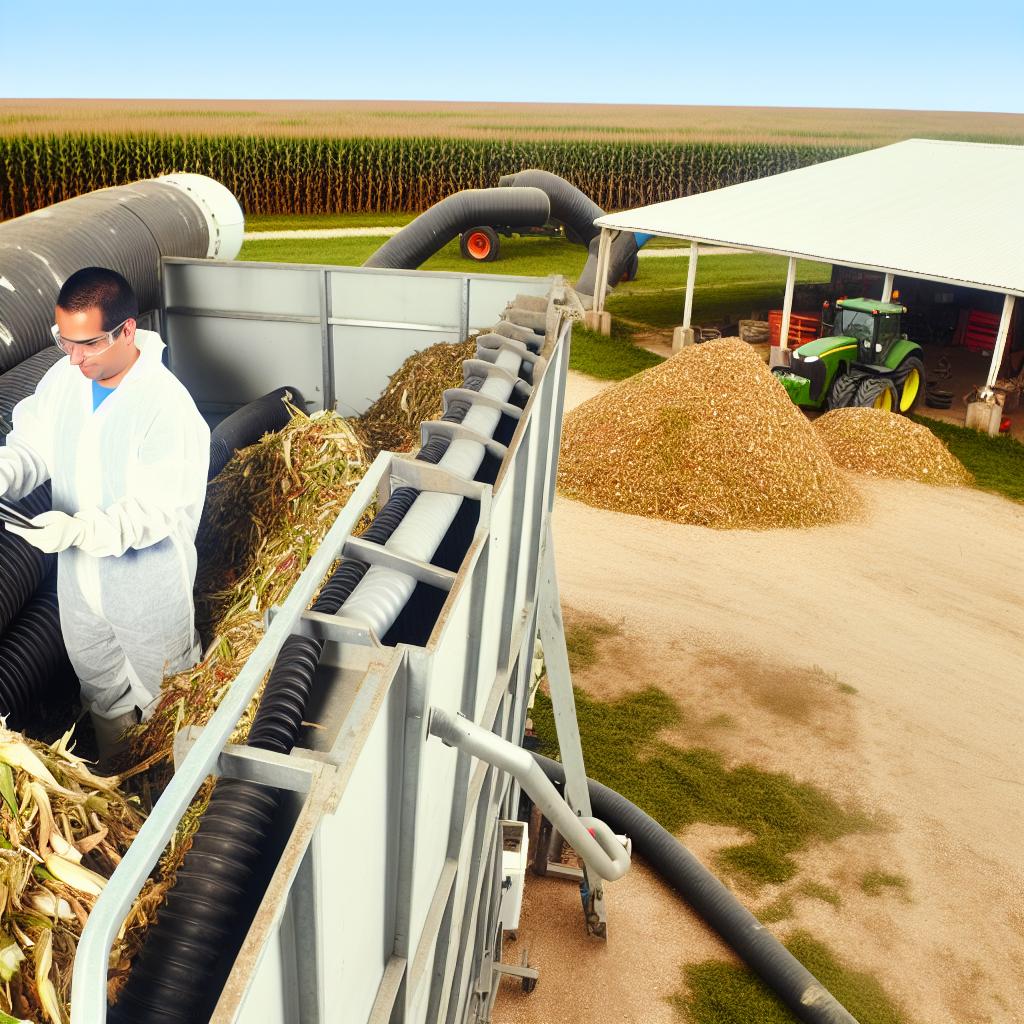
Innovative Technologies for Waste Recycling on Farms
Biogas Production Systems
Biogas systems transform organic waste into renewable energy.
This process involves anaerobic digestion of livestock manure and crop residues.
Farmers can utilize biogas to power machinery and heat buildings.
Moreover, the leftover digestate serves as a nutrient-rich fertilizer.
Composting Techniques
Composting converts agricultural waste into valuable soil amendments.
This method enhances soil health and boosts crop yields.
Farmers can compost vegetable scraps, yard waste, and livestock bedding.
Using aerobic microbes accelerates the decomposition process.
Additionally, farmers can implement vermicomposting to utilize earthworms.
Biochar Applications
Biochar production involves pyrolyzing biomass under limited oxygen.
This innovative technology improves soil fertility and carbon sequestration.
Farmers can apply biochar to retain moisture and enhance nutrient availability.
Furthermore, biochar aids in reducing greenhouse gas emissions.
Agricultural Residue Management
Proper management of crop residues prevents waste accumulation.
Farmers can utilize residues for livestock feed or bedding.
Implementing no-till practices enhances soil structure and prevents erosion.
Additionally, mulching with crop residues reduces weed growth.
Advanced Processing Technologies
Farmers can adopt innovative processing technologies for waste recycling.
Showcase Your Farming Business
Publish your professional farming services profile on our blog for a one-time fee of $200 and reach a dedicated audience of farmers and agribusiness owners.
Publish Your ProfileThese methods include enzymatic breakdown and thermochemical conversions.
Such technologies allow for the extraction of bioactive compounds from waste.
Ultimately, they contribute to creating high-value products.
Economic Benefits of Converting Waste into Resources
Reducing Costs
Converting farm waste into resources reduces disposal costs significantly.
Farmers can save money by minimizing waste removal fees.
Moreover, using waste as resources decreases the need for external inputs.
This leads to better management of overall farm expenditures.
Generating Additional Income
Transforming waste into valuable products opens new revenue streams.
Farmers can sell compost, biochar, and biogas for profit.
These products can be marketed to local businesses and consumers.
This practice increases farm income while benefiting the environment.
Enhancing Product Value
Utilizing waste effectively can enhance the value of agricultural products.
High-quality compost improves soil health, leading to better crop yields.
Subsequently, higher yields translate into increased market opportunities.
Additionally, using organic inputs attracts eco-conscious consumers.
Boosting Sustainability
Converting waste into resources promotes sustainable farming practices.
This approach reduces reliance on chemical fertilizers and pesticides.
Sustainable practices also improve farm resilience against climate change.
Moreover, they contribute to overall ecosystem health and biodiversity.
Creating Jobs
The waste-to-resource transformation encourages job creation in local communities.
New industries around composting and bioenergy generate employment opportunities.
As farms innovate, they also stimulate local economies.
This dynamic fosters a sense of community investment and support.
Case Studies: Successful Transformations of Farm Waste
Innovating with Dairy Waste
Green Valley Farm has become a pioneer in transforming dairy waste.
They implemented a biogas system to convert manure into energy.
This approach reduces greenhouse gas emissions significantly.
Moreover, they now produce heat and electricity for the farm.
The leftover digestate improves soil quality for their crops.
Turning Crop Residues into Biochar
AgriTech Solutions took a creative approach with crop residues.
They developed a method to create biochar from leftover biomass.
This process enhances soil fertility while sequestering carbon.
Farmers report improved crop yields and reduced fertilizer costs.
The initiative significantly decreases agricultural waste disposal issues.
Utilizing Green Waste for Eco-Friendly Packaging
EcoPack Innovations has revolutionized the way we view green waste.
They create biodegradable packaging from agricultural by-products.
This sustainable alternative reduces reliance on plastic materials.
Furthermore, it decreases waste sent to landfills.
Customers appreciate this environmentally friendly option, boosting sales.
Composting Fruit and Vegetable Waste
Harvest Hope Farms focuses on composting excess produce.
They convert unsold fruits and vegetables into nutrient-rich compost.
Showcase Your Farming Business
Publish your professional farming services profile on our blog for a one-time fee of $200 and reach a dedicated audience of farmers and agribusiness owners.
Publish Your ProfileThis method not only minimizes food waste but enriches soil health.
Farmers using their compost see remarkable improvements.
Additionally, this practice fosters a circular economy within local communities.
Future Trends in Sustainable Waste Management in Agriculture
Innovative Technologies
Emerging technologies transform farm waste into useful products.
For instance, anaerobic digestion processes convert organic waste into biogas.
This gas can power homes and machines on the farm.
Additionally, composting techniques continue to improve, enhancing soil quality.
Farmers increasingly adopt these methods for better waste management.
Circular Economy Practices
Adopting circular economy principles is becoming essential in agriculture.
This approach minimizes waste and promotes resource regeneration.
By reusing materials, farms can significantly reduce their environmental footprint.
Examples of this practice include using crop residues as animal feed.
Thus, farms can establish a more sustainable production cycle.
Collaboration and Community Engagement
Collaboration between farms and local communities enhances waste management strategies.
Partnerships enable resource sharing and waste reduction initiatives.
Moreover, communities can participate in recycling programs effectively.
Engaging with local governments helps set beneficial policies.
Such collaboration fosters innovation and accountability.
Regulatory Developments
Regulatory changes are directing attention towards sustainable practices.
Governments are introducing policies to encourage waste reduction.
Subsidies and incentives for eco-friendly technologies are becoming common.
These policies support farmers in adopting sustainable practices.
As a result, compliance with environmental regulations improves efficiently.
Education and Training
Education initiatives play a pivotal role in sustainable waste management.
Training programs equip farmers with knowledge of best practices.
Workshops highlight the importance of waste reduction techniques.
Farmers who participate in these programs see enhanced management skills.
These educational efforts promote a culture of sustainability in agriculture.
Additional Resources
Sustainable Solutions for Fish Waste Management | Shapiro
Rethread Africa: Transforming agricultural waste into sustainable …

